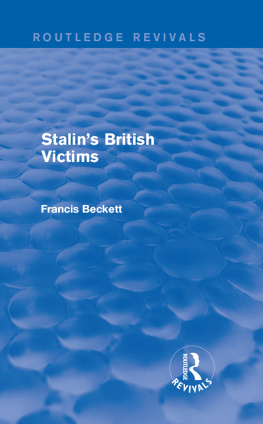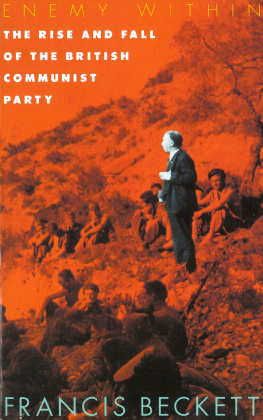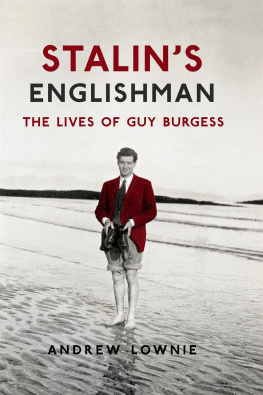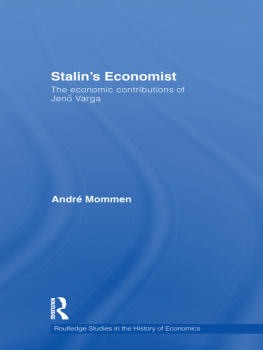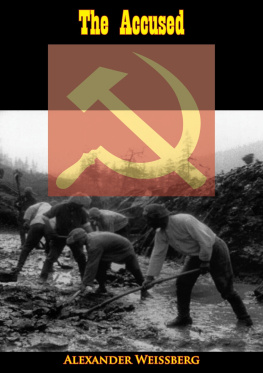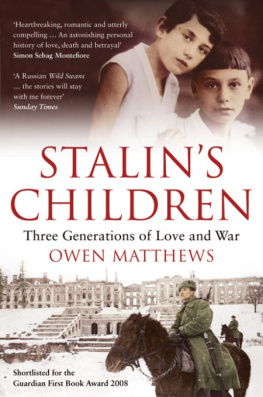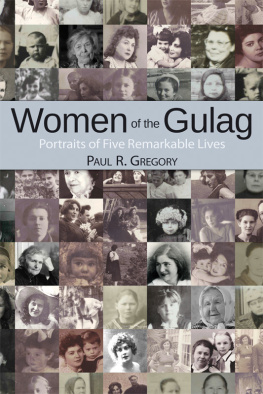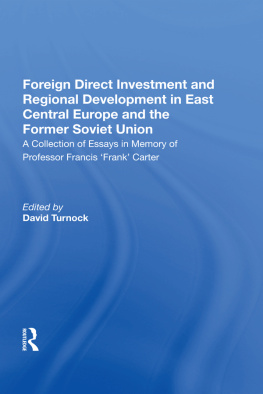
Routledge Revivals
Stalins British Victims
First published in 2004, this book tells the stories of four remarkable British women, whose lives were scorched by Stalins purges. One was shot as a spy; one nearly died as a slave labourer in Kazakhstan; and two saw their husbands taken away to the gulag and had to spirit their small children out of the country.
We think of the horrors of the middle of the twentieth century- the Holocaust in Central Europe, the purges in the Soviet Union- as something foreign: terrible, but remote. Rosal Rust, Rose Cohen, Freda Utley, and Pearl Rimel were all Londoners. Like hundreds of young, idealistic Britons in the 1930s, they looked to the Soviet Union for inspiration, for a way in which society could be run better, without the exploitation and poverty which unrestrained capitalism had created. They were less fortunate than most of us: they saw their dreams fulfilled.
In this book, Francis Beckett draws on personal letters, interviews with surviving relatives and archivists to create a picture of four courageous, intelligent, and very different women. The result is a harrowing human document with vivid and unforgettable insights into the world of Stalins Russia: its secret trials, labour camps, random disappearances, and concealed executions.
Stalins British Victims
Francis Beckett

First published in 2004
by Sutton Press
This edition first published in 2016 by Routledge
2 Park Square, Milton Park, Abingdon, Oxon, OX14 4RN
and by Routledge
711 Third Avenue, New York, NY 10017
Routledge is an imprint of the Taylor & Francis Group, an informa business
2010 Francis Beckett
The right of Francis Beckett to be identified as author of this work has been asserted by him in accordance with sections 77 and 78 of the Copyright, Designs and Patents Act 1988.
All rights reserved. No part of this book may be reprinted or reproduced or utilised in any form or by any electronic, mechanical, or other means, now known or hereafter invented, including photocopying and recording, or in any information storage or retrieval system, without permission in writing from the publishers.
Publishers Note
The publisher has gone to great lengths to ensure the quality of this reprint but points out that some imperfections in the original copies may be apparent.
Disclaimer
The publisher has made every effort to trace copyright holders and welcomes correspondence from those they have been unable to contact.
ISBN 13: 978-1-138-94740-5 (hbk)
ISBN 13: 978-1-315-67002-7 (ebk)
STALINS BRITISH VICTIMS
FRANCIS BECKETT
First Published in the United Kingdom in 2004 by
Sutton Publishing Limited Phoenix Mill
Thrupp Stroud Gloucestershire GL5 2BU
Copyright Francis Beckett, 2004
All rights reserved. No part of this publication may be reproduced, stored in a retrieval system, or transmitted, in any form, or by any means, electronic, mechanical, photocopying, recording or otherwise, without the prior permission of the publisher and copyright holder.
Francis Beckett has asserted the moral right to be identified as the author of this work.
British Library Cataloguing in Publication Data
A catalogue record for this book is available from the British Library.
ISBN 0-7509-3223-6
Typeset in Sabon 11/14.5pt.
Typesetting and origination by
Sutton Publishing Limited.
Printed and bound in England by
J.H. Haynes & Co. Ltd, Sparkford.
Contents
T his book tells the stories of four remarkable British women whose lives were scorched by Stalins purges. One was shot as a spy; one nearly died as a slave labourer in Kazakhstan; and two saw their husbands taken away to the gulag and had to spirit their small children out of the country.
We in Britain think of the horrors of the middle of the twentieth century the Holocaust in Central Europe, the purges in the Soviet Union as something foreign: terrible, but remote, like famine in Africa. But Rosa Rust, Rose Cohen, Freda Utley and Pearl Rimel were all Londoners, as English as fish and chips, as familiar in our capital as Piccadilly Circus. Like hundreds of young, idealistic Britons in the 1930s, they looked to the Soviet Union for inspiration, for a way in which society could be run better, without the exploitation and poverty that unrestrained capitalism had created in Britain. They were less fortunate than most of us: they saw their dream fulfilled.
This book does not pretend to be a history of the purges, nor even a history of Britons in the purges. Dozens, perhaps hundreds, of Britons joined the millions of Russians who suffered under Stalin the KGB holds files on 1,500 British citizens. You will find something about some of the others in .
But I became fascinated with these four women, and wanted to discover what sort of people they were and what motivated them, what their families and husbands and children were like, and what they felt when their dream disintegrated and turned to poison in front of them. I went in search of everything it was possible to find out about them, talking to their surviving relatives, looking at their surviving letters, and finding out what I could from the archives of the Communist International in Moscow.
I discovered more than enough to admire all four of them, and to draw a picture of four human beings who had little in common apart from courage, intelligence, originality and idealism, which all four had in abundance; and to explain how they coped with events which would have crushed many of us.
This book tells the dramatic stories of their lives. It tries to put those lives in context: in Moscow and London in the 1920s and 1930s, and in New York, Los Angeles, London and Redcar during the second half of the twentieth century.
The years immediately after the First World War and the 1917 Revolution in Russia were years of hope and optimism, when the British generation that had fought in the war vowed that their friends had not died in order to return to the same old unfair society they had known before 1914. This book is not just the story of four women. It is also the story of how those high hopes turned to dust and ashes in the years between the two world wars.
There are two views of Stalins purges in 19368, in which millions were judicially murdered. One, articulated by Nikita Khrushchev in his expos of Stalin in 1956, was that these events were simply the result of Stalin himself, a pot of poison at the heart of an otherwise benevolent social system. The other is that they were an integral part of the Soviet system inaugurated by Lenin in the 1917 Bolshevik Revolution. This second view was most neatly summed up by Robert Conquest:
There was a great Marxist called Lenin
Who did two or three million men in.
Thats a lot to have done in
But where he did one in
That grand Marxist Stalin did ten in.
If pressed I incline to the Khrushchev view. Conquest is less than fair to Lenin. Communism did not have to be the murderous, viciously petty-minded, sectarian and vindictive thing my four principal characters found in the Soviet Union. In theory, communism is a generous and fair-minded creed, which rejects, for good reason, the poverty amid plenty which is the hallmark of capitalism. Theres a case for saying that it was simply hijacked by a cold-blooded mass murderer. But for that to be possible, the fault line had to be there. And the fault line was there. The seeds for the Stalin terror were there; but they needed a monster like Stalin to nurture them. The fault line was the sectarian intolerance and the lack of feeling for individual human beings which Russian communists took to be virtues.
Next page
